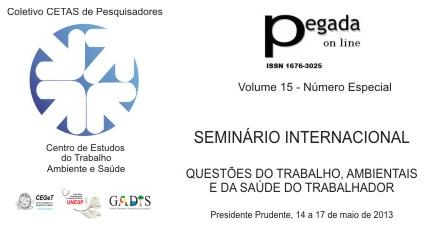Educação Ambiental e Gerenciamento Integrado de Resíduos Sólidos: Influência do Grupo de Apoiadores no Modelo de Gestão de Uma Cooperativa de Reciclagem de Resíduos Sólidos | Environmental Education and the Integrated Management of Solid Waste: The Influe
DOI:
https://doi.org/10.33026/peg.v0i0.2916Resumen
Introduction: This research derives from our experience of support groups since 2006. In seeking to understand the way in which a co-operative organization works, it is necessary to find out how and by whom it is managed. In order to put this organization into context, this project needed to establish a perspective that addressed the relevant points: society, exclusion, garbage, job insecurity. The research aims to show how support groups in a social intervention project develop a dual role for beneficiaries: 1) as institutional agents who use their respective institutions to direct decisions and actions to make changes in the work place of the beneficiary, 2) to influence the liberation of geographic space in the work of beneficiaries (cultural, educational, ideological, social and psychological). The hypothesis is that those who bring this about are the support groups because the original co-operative perspective sprang from them, and all management processes for more than ten years have taken place through this group. Our thesis seeks to find the evidence and investigate whether there is a real problem. It will be carried out through a systematic analysis of management over the last ten years. Methodology and development: An in-depth analysis will require not only a review of the literature concerning different studies of Cooperlix in Presidente Prudente, SP, but mainly the institutional articulation mechanisms which characterize the geography of the work, with the aim that the study will lead us to a socio-organizational structure that goes beyond the co-operative and its members. Once all the research involving the collection of data from various sources has been completed, we will make use of a research practice involving intensive direct observation (observation and interview), and also extensive direct observation (questionnaire). The research will be exploratory, aiming to identify and systematize current information concerning the scope of work and its influence on the behavior of those involved. Documentary research will be carried out within the different organizations involved with the intention of mapping influence and interaction between them and Cooperlix. Individuals who make up the support groups, selected according to certain criteria, will be interviewed. Interviews will be conducted with the co-operative in order to identify and interpret their perceptions of the changes it has undergone, influenced by the support groups. It will be possible to identify the management model adopted in the last ten years from this information. Analysis will take place at different times as each stage of the research will require individual analysis. Final thoughts: The results of this research will contribute to establishing an understanding of the actions and practices of the support groups.
Descargas
Publicado
Cómo citar
Número
Sección
Licencia
1- Autores mantém os direitos autorais e concedem à Pegada o direito de primeira publicação, com o trabalho simultaneamente licenciado sob a Creative Commons Attribution License, que permite o compartilhamento do trabalho com reconhecimento da autoria do trabalho e publicação inicial nesta revista.
2- As provas finais não serão enviadas aos autores.
3- Os trabalhos publicados passam a ser incorporados a revista PEGADA, ficando sua impressão e reimpressão, total ou parcial, autorizadas pelo autor. A utilização do texto é livre e incentivada a sua circulação, devendo ser apenas consignada a fonte de publicaçao original.
4- Os originais não serão devolvidos aos autores.
5- As opiniões emitidas pelos autores dos artigos são de sua exclusiva responsabilidade.
6- A revista se reserva no direito de efetuar, nos textos aprovados, alterações de ordem normativa, ortográfica e gramatical, comvistas a manter o padrão da língua, respeitando, porém, o estilo dos autores.
Declaración de derechos de autor
1- Los autores poseen los derechos de autor y conceden el derecho de primera publicación a la Revista PEGADA. El trabajo publicado estará licenciado bajo los parámetros de Creative Commons Atribution License ![]() , los cuales permiten la utilización y difusión del trabajo publicado con el reconocimiento de la autoría y origen del trabajo publicado.
, los cuales permiten la utilización y difusión del trabajo publicado con el reconocimiento de la autoría y origen del trabajo publicado.
2-Las pruebas finales no serán enviadas a los autores.
3-Los trabajos publicados pasan a ser incorporados a la revista PEGADA, la cual autoriza la impresión y reimpresión, total o parcial. La utilización del texto será libre con el fin de incentivar su circulación, amparada por la licencia de publicación que exige la citación de la fuente original.
4-Los textos originales no serán devueltos a los autores.
5-Las opiniones emitidas por el/los autor/es de los artículos son de su exclusiva responsabilidad.
6-La revista se reserva el derecho a realizar en los textos aprobados alteraciones de orden normativa, ortográfica y gramatical con el objetivo de mantener el uso correcto de la lengua, respetando el estilo de los autores.
Copyright Declaration
1- Authors maintain the copyright and grant to Pegada Journal the right of first publication, with the manuscript simultaneously licensed to the Creative Commons Attribution License, which allows the sharing of the manuscript with acknowledgment of the authorship of the manuscript and initial publication in this journal.
2- Final exams will not be sent to the authors.
3- Published manuscripts will be incorporated to the PEGADA Journal, being its printing and reprint, total or partial, authorized by the author. The use of the text will be free and its circulation stimulated. It has only to be consigned to the source of the original publication.
4 - The originals manuscripts will not be returned to the authors.
5- The opinions expressed by the authors of the manuscripts are their exclusive responsibility.
6- The journal reserves the right to make normative, orthographic and grammatical changes in the approved texts, keeping the language standard, but respecting the authors' style.

